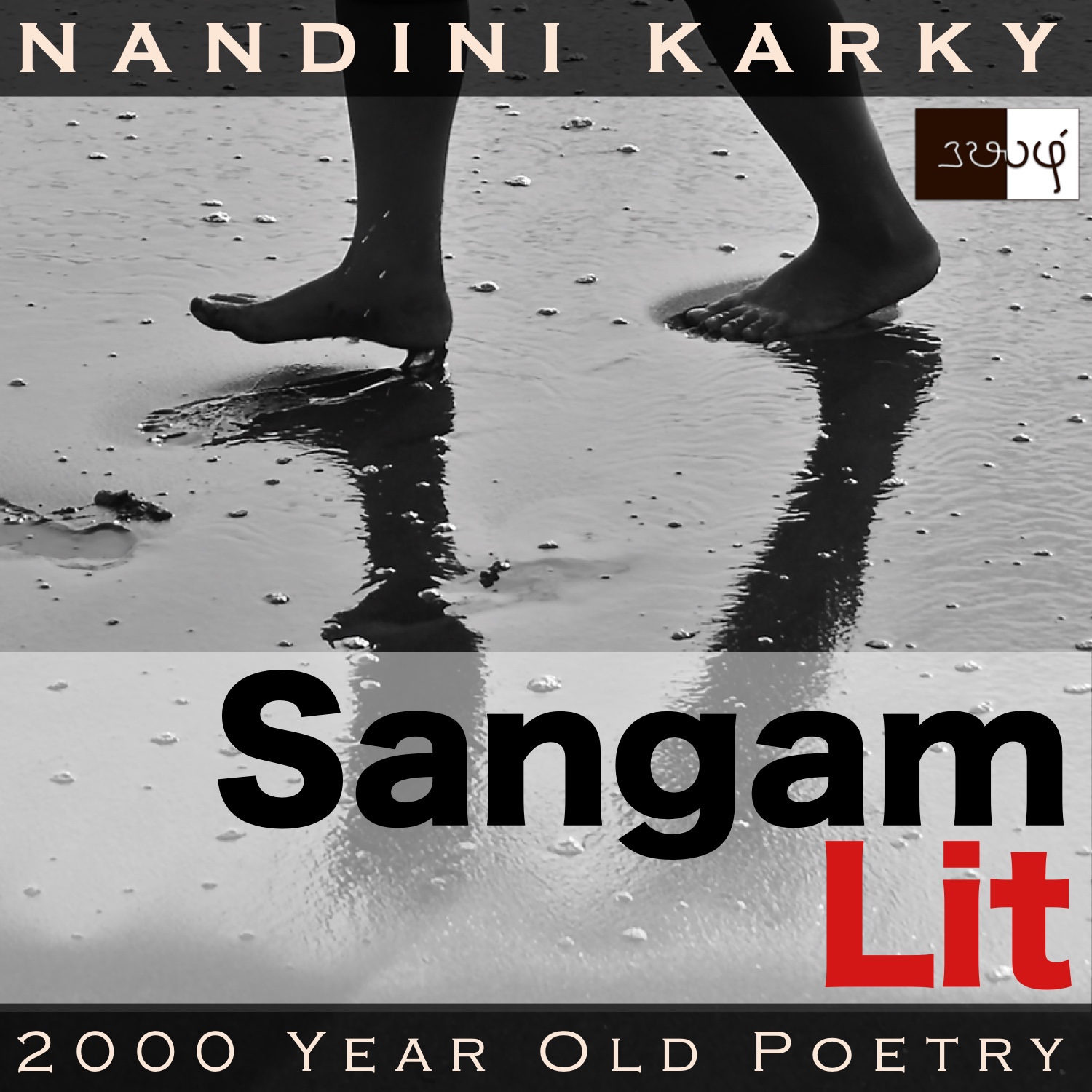Podcast: Play in new window | Download
Subscribe: Apple Podcasts | Spotify | Amazon Music | Android | iHeartRadio | TuneIn | RSS | More

In this episode, we empathise with the inner life depicted in Sangam literary work, Natrinai 38, written by Ulochanar, set in the ‘Neythal’ landscape or the coastal regions. The verse speaks in the voice of the lady, replying to her confidante about the shades of her mind.
வேட்டம் பொய்யாது வலைவளம்சிறப்ப,
பாட்டம் பொய்யாது பரதவர் பகர,
இரும் பனந் தீம் பிழி உண்போர் மகிழும்
ஆர் கலி யாணர்த்துஆயினும், தேர் கெழு
மெல்லம் புலம்பன் பிரியின், புல்லெனப்
புலம்பு ஆகின்றே-தோழி! கலங்கு நீர்க்
கழி சூழ் படப்பைக் காண்டவாயில்,
ஒலி காவோலை முள் மிடை வேலி,
பெண்ணை இவரும் ஆங்கண்
வெண் மணற் படப்பை, எம் அழுங்கல் ஊரே.
The poem has a musical quality to it, with its repeating rhyme structure. We have ‘வேட்டம் -பாட்டம்’ , ‘புல்லெனப் புலம்பு’ and ‘பெண்-வெண்’ interwoven within the words. The poem also echoes with the loud sounds of celebration as revealed to us, by the words ‘மகிழும்’ meaning ‘enjoying’ and ’அழுங்கல் ஊரே’ meaning ‘loud and bustling town.’ Speaking of loud, the word ‘ஒலி’ is usually associated with ‘sound’ but in this poem and in other Sangam poems, ‘ஒலி’ means ‘to prosper’ or ‘to be luxuriant’ and is generally used in connection with the leaves of trees. Like an uninhibited child, I would like to weave a random connection and say that maybe when leaves prosper in a tree, they dance with the breeze, making their song echo with a rich sound and hence, the two connotations of the word in Tamil! While joy abounds on the outside, our lady seems to not be in the same frame of mind for she says ‘புல்லெனப் புலம்பு ஆகின்றே’ meaning ‘dull and sad like the spreading of weeds’. Let’s look in to see the reasons for her sadness.
It’s a time when the man has parted away from the lady and she pines for him, losing her health. It’s then the confidante warns the lady that the town may gossip if she were to remain so. To this, the lady replies saying, “Our town is surrounded by fertile seas, where fishing never fails to yield a bounty in the nets. The rains and winds never fail too and they aid the people of our town to trade their wares afar. Situated at such a prosperous space, our content townsmen revel in the pleasures of the toddy from the palm tree at the end of the day’s work. Blending their joyous sounds and the roaring of the waves, dwells our loud and happy hamlet. Be it as it may, when the lord of my heart has parted away in his chariot, even this happy town becomes dull and sad to me. Yes, I refer to this very town filled with muddled backwaters called as ‘Kaandavaayil’. This bustling place wherein luxuriant palm leaves are intertwined with thorny bushes to weave a fence around and where tall palm trees stretch about in the expanse of the white sand beach. This beautiful and bubbling town turns dull and distressful to me, now that he is not here. What am I to do, my friend?”
The life of this ancient seaside town unfolds before our eyes. We see men searching the seas for fish and pearls and the sea, in turn, giving them all they seek, like an affectionate mother. Nature seems to be on the side of these folks for winds and rains seem to be on a perfect schedule, lending the helping hand to these sea-farers to trade their wares in distant places. It’s a rich seaside town where there’s plenty to go around and these workers end their day in celebration, drinking toddy from the palm tree and indulging in joyous revelry. Who wouldn’t want to join in the fun? And yet, though the outer life seems to be the epitome of joy and pleasure, in stark contrast, is the mind of the lady, whose inner expanse seems to be filled with weeds, reflecting the scene of sadness, for her man is not there nearby.
And yet again, the spotlight falls on the power of the mind. It’s a world unto itself. It matters not what the world outside seems to be. It can be the happiest place on earth but the mind makes its own rules. The world created inside the head seems to eclipse the world outside. In this poem, the sad and barren world of the lady’s mind, left so by the departure of the man, negates the joy of the world outside, no matter how loud or persuasive. If we were to turn this upside down, wouldn’t it be true that however sad or broken the world outside may seem to be, an inner world, built with thought and clarity, would have the power to turn it upside down? What say we vow to build that world of plenty within, every day?




Last para about our inner world is very much important in this covid time 😊 Thank you for your positive words 😍